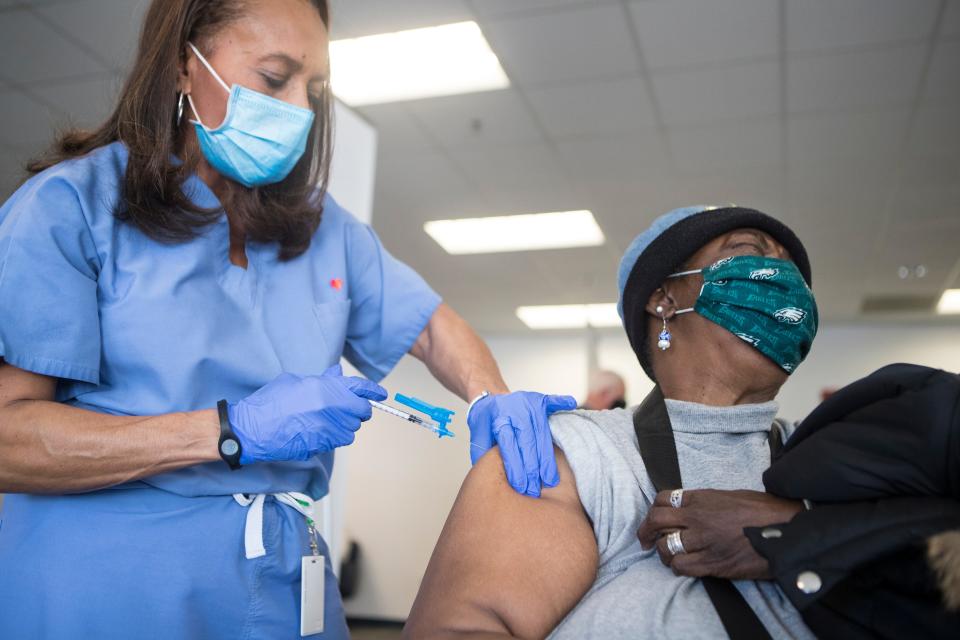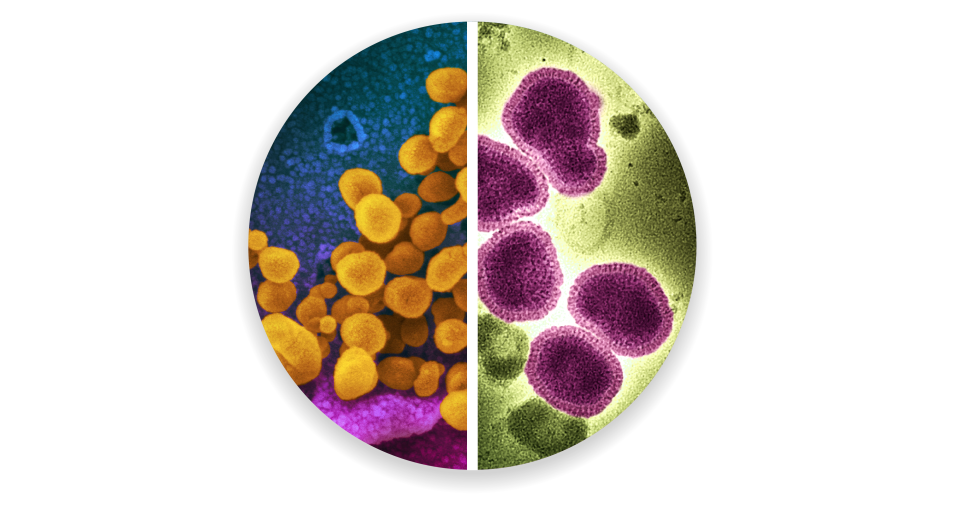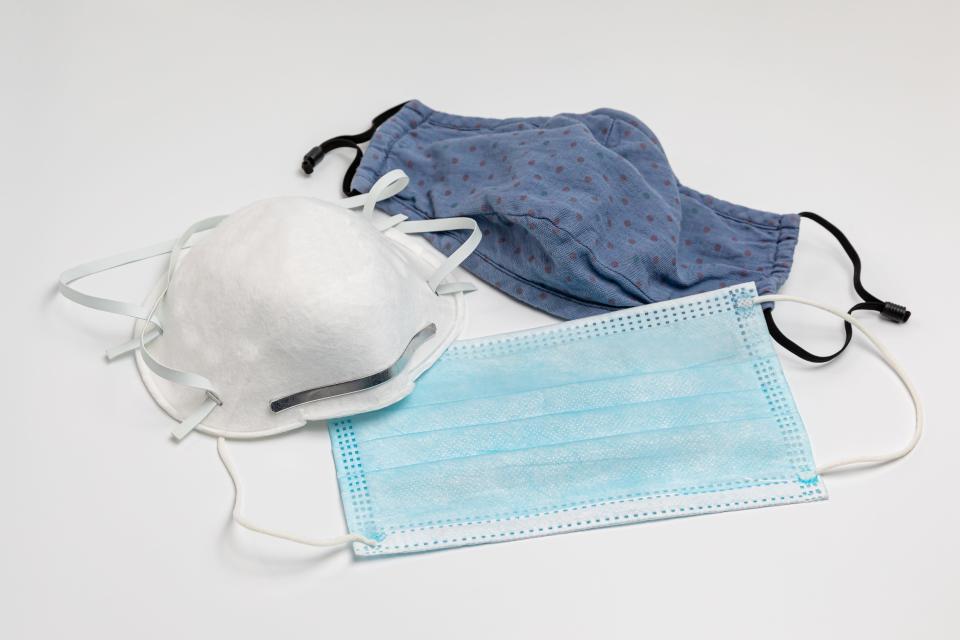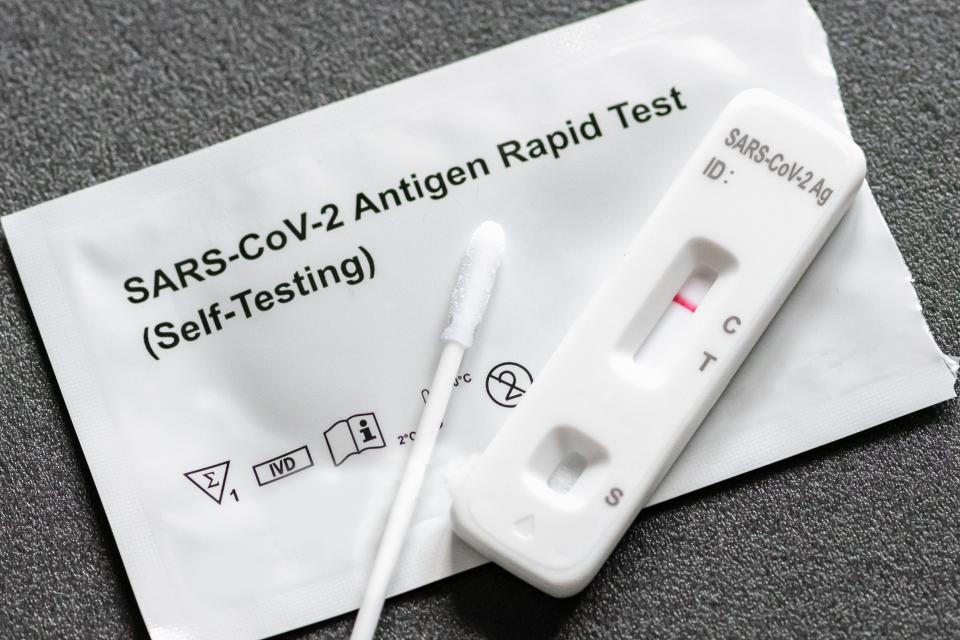'Tis the season: What to know about rise in COVID-19 cases, how to stay safe in Delaware
- Oops!Something went wrong.Please try again later.
Cases of COVID-19 continue to spike, with the frequency of some variants rising quickly.
The Center for Disease Control and Prevention’s Nowcast variant tracker posted on Nov. 27 shows that the BA.2.86 variant – a mutated COVID strain previously thought to be uncommon – is projected to account for nearly one-tenth of circulating viruses. Two weeks ago, the variant made up 3% of cases. These figures are based on estimates of circulating variants.
Similar to other viruses, COVID constantly changes through mutations, making it easier for the virus to spread or resist medicines and vaccines.
COVID cases in Delaware

The Delaware Division of Public Health’s Coronavirus Data Dashboard shows that Delaware has 341,196 total positive cases of COVID as of Nov. 29. Of those cases, 306, 298 are confirmed, 34,898 are probable and 6,416 were documented in residents of long-term care facilities.
New Castle County accounts for the highest number of positive cases at 193,222, followed by Sussex County with 81,255 and Kent County with 66,234.
In the past week, New Castle County saw 205 new positive cases, Sussex County saw 131 new positive cases and Kent County saw 84 new positive cases. COVID infections are most prevalent in the 18 to 34 age range, followed by the 35 to 49 age range and the 5 to 17 age range, according to the Coronavirus Data Dashboard.

As of Nov. 29, there are 67.1 current hospitalizations and 7.9 current critical hospitalizations from COVID, according to the dashboard.
To date, there are 3,512 total deaths from COVID-19 in Delaware, with 3,108 confirmed, 404 deemed probable and 1,091 occurring in long-term care facilities. The CDC defines “probable cases” as those meeting certain clinical or vital records criteria and/or lacking a confirmed lab test for COVID.
For COVID vaccines, only 11.4% of the population of Delaware is vaccinated with the updated 2023-2024 dose.
What are the symptoms of COVID? How long do COVID symptoms last?
People with COVID-19 can experience a wide range of symptoms from mild reactions to severe illness. Symptoms may appear two to 14 days after exposure to the virus, according to the CDC.
Possible COVID symptoms include:
Cough
Fatigue
Fever or chills
Shortness of breath or difficulty breathing
Sore throat
Headache
Congestion or runny nose
Muscle or body aches
New loss of taste or smell
Diarrhea
Nausea or vomiting
As new COVID variants arise, symptoms may change and can vary depending on vaccination status, according to the CDC.

If you have any of the following symptoms, these are emergency warning signs for COVID and the CDC advises you to immediately seek emergency medical attention by calling 911 or calling ahead to your local emergency facility:
Trouble breathing
New confusion
Pale, gray, or blue-colored skin, nail beds or lips, depending on skin tone
Persistent pain or pressure in the chest
Inability to stay awake
Before getting treated, be sure to notify the phone operator that you are seeking care for someone who has or may have COVID.
Who should get tested for COVID?

COVID tests are available for anyone to take, whether they have symptoms or not.
If you meet any of the following criteria, you should get tested for COVID and self-quarantine at home while you wait for your results, according to the Delaware Division of Public Health:
Anyone who has symptoms.
Anyone preparing to attend a large gathering should get tested one to two days prior.
Anyone exposed to someone confirmed to have COVID; you should get tested after five days.
If you have symptoms and get a negative test result, take another test 2 days later.
You should follow the latest CDC guidance for isolation, which includes information about how long you should isolate for, groups you should avoid during and immediately after your COVID-19 infection, and when you can stop wearing a mask.
If your test results still come back negative, there are other viruses going around, including RSV and influenza, so you should stay home until you are no longer feeling sick. Follow the latest CDC guidance for self-testing and isolating.
RSV vaccine supply dwindles: The RSV vaccine is scarce as cases continue to climb. What to know and prevention tips.
How to prevent the spread of COVID

Aside from getting tested for COVID after showing symptoms or potentially being exposed to the virus, the CDC suggests the following actions as ways to help prevent the spread:
Move indoor activities outside, where virus particles do not build up in the air outdoors as much as they do indoors.
Get tested for COVID even if you don’t have symptoms or a recent exposure concern. It can help you make informed decisions about your actions.
Stay up to date with COVID vaccines, especially if you have a weakened immune system.
Wear a mask or respirator to block droplets and particles you breathe, cough or sneeze out. Be sure that the mask you choose fits correctly by covering your mouth and nose and fitting closely to your face.
Increase space and distance between yourself and others when in public.
Improve ventilation by opening windows; increasing air filtration and frequently changing air filters in your heating, ventilation and air conditioning system; using portable high-efficiency particulate air cleaners; turning on exhaust fans; and turning your thermostat to “on” instead of “auto” to ensure continuous airflow and filtration.
If you are unable to isolate yourself from someone in your home or must care for someone who has tested positive for COVID, properly wash your hands frequently, wear a high-quality mask and keep your distance when possible.
Planning to get the COVID vaccine soon? The Division of Public Health recommends getting vaccinated at least two weeks before traveling to allow the full effects of the vaccine to develop in your body for maximum protection.
How to get tested for COVID in Delaware

Aside from at-home testing kits, available for free from the government or for purchase at local retailers, your best testing option might be to visit free local testing sites near you, which can be found by visiting testinglocator.cdc.gov/.
Once you enter your ZIP code, a list of nearby testing options, along with instructions for scheduling an appointment, will be displayed.
How to get free COVID tests by mail
To place an order for your four free at-home COVID-19 tests, visit special.usps.com/testkits.
The website will prompt you to enter a mailing address and an email and will have a checkout cost of zero. The offer is limited to one order per residential address and includes four individual rapid antigen COVID-19 tests, also referred to as self-tests or over-the-counter tests.
Once the order is placed, an email will be sent to the account used for checkout confirming the order. When the at-home tests are shipped to your home, you will receive a follow-up email with tracking information.
As of Nov. 20, all households are eligible to receive four additional at-home COVID test kits for free following the same instructions, according to an announcement from the U.S. Department of Health and Human Services.
USA Today contributed to this report.
Got a tip or a story idea? Contact Krys'tal Griffin at kgriffin@delawareonline.com.
COVID test FAQ: What to know about at-home COVID test expiration dates, how to get free tests and more
Details on new COVID variant: The new COVID-19 variant BA.2.86 is in Delaware. Here's what you need to know
This article originally appeared on Delaware News Journal: Cases of COVID-19 variant BA.2.86 triple in 2 weeks. What to know

